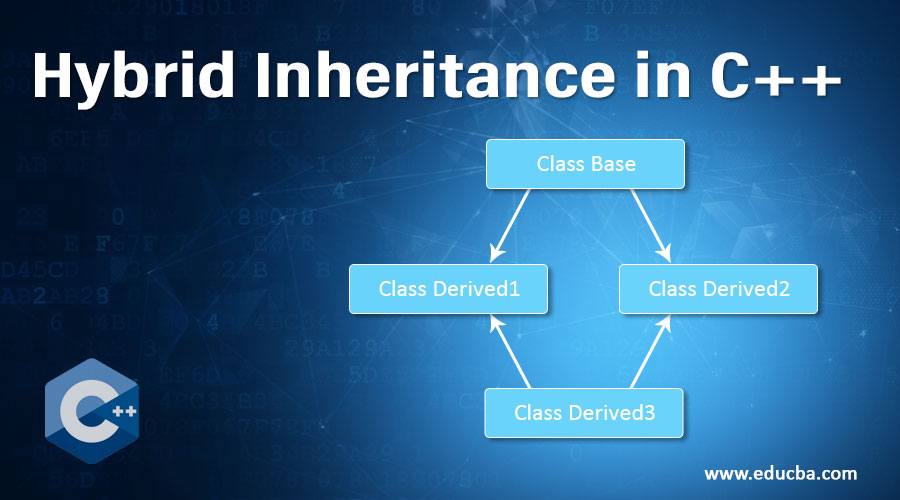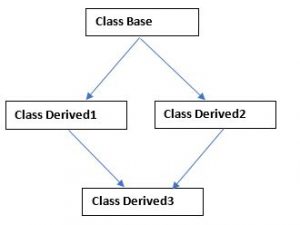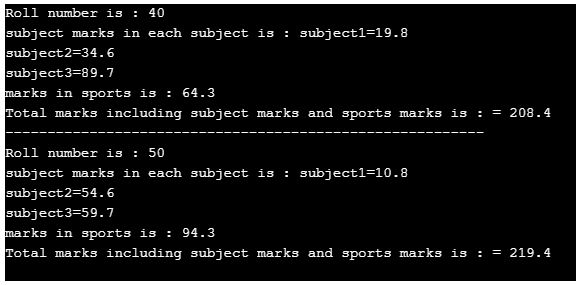Updated June 14, 2023

Introduction to Hybrid Inheritance in C++
The following article provides an outline of Hybrid Inheritance in C++. It is a combination of more than one type of inheritance. For example, it can be achieved with a combination of both multilevel and hierarchical inheritance. This type of inheritance is sometimes also called multipath inheritance.
Syntax:
class Base
{
// body of Base class
};// end of Base class
class Derived1: access_mode Base
{
// access_mode can be public, private or protected
//body of Derived1 class which inherit property from base class
}; // end of class Derived1
class Derived2: access_mode Base
{
// access_mode can be public, private or protected
//body of Derived2 class which inherit property from Base class
};//end of class Derived2
class Derived3: access_mode Derived1, access_mode Derived2
{
// access_mode can be public, private or protected
//body of Derived3 class which inherit property from both Derived1 and Derived2 class.
};//end of class Derived3How Hybrid Inheritance Works in C++?
The following diagram illustrates and shows the working of hybrid inheritance.
As explained in the above diagram, class Derived1 inherits property from class Base. Another class, Derived2, is inheriting property from class Base. Class Derived3 inherits property from both class Derived1 and class Derived2. Here class Derived3 has all the properties of class Base, so by creating the object of class Derived3, we can access all member variables and member functions declared and defined in class Base. By creating an object of class Derived3, we can also access and use the member function and member variable of class Derived1 and class Derived2.
Example of Hybrid Inheritance
Include all the required header files.
Code:
#include<iostream>
#include<conio.h>
// student class which is base class
class student
{
// Body of student class which contain declaration and definition of all members of student class
protected:
int rollnum; // rollnum is protected member of student class
public:
// set_rollnum is function which is used to set the value to protected member rollnum through public member function
void set_rollnum(int num)
{
rollnum=num; // protected member of class is assigned value using public member function
}
// print_rollnum is function to print the value of rollnum
void print_rollnum(void)
{
std::cout<<"Roll number is : "<<rollnum<<"\n"; // print the value of rollnum
}
}; // end of class student
// class subject which inherits property from class student
class subject:public student
{
// Body of class subject
// protected member variables of subject class
protected:
float subject1, subject2, subject3; // subject1, subject2 and subject3 are protected float members of class subject
// public member functions of class subject
public:
//set_subjectmark is public member function to assign the values to the protected member variables of subject class
void set_subjectmark(float a,float b,float c)
{
// assigning values to the all protected member variables of the subject class
subject1 = a; // assign value a to the subject1
subject2 = b; // assign value b to the subject2
subject3 = c; // assign value c to the subject3
}
// print_subjectmarks is public member function of the class subject to print values of protected member variables subject1,subject2 and subject3
void print_subjectmarks()
{
std::cout<<"subject marks in each subject is : "<<"subject1="<<subject1<<"\n"<<"subject2="<<subject2<<"\n"<<"subject3="<<subject3<<"\n";
}
}; // end of class subject
// class sports which inherits property from class student
class sports
{
// Body of class sports
// protected member variable of class sports
protected:
float sport_marks; //sport_marks is protected member variable of class sports
// public member functions of class sports
public:
// public member function set_sports_marks of class sports which is used to set value to protected member variable sport_marks
void set_sports_marks(float marks)
{
sport_marks=marks; // assign value to protected member variable sport_marks
}
// print_sports_marks function to print value of protected member variable sport_marks
void print_sports_marks(void)
{
std::cout<<"marks in sports is : "<< sport_marks <<"\n";
}
}; // end of class sports
// class overall_result which inherits property of both class subject and class sports
class overall_result: public subject , public sports
{
// Body of class overall_result
private:
float total_marks; // total_marks is private member variable of class overall_result
public:
void display_total(void);// display_total is public member function of class overall_result
};// end of class overall_result
void overall_result::display_total(void)
{
// Body of function display_total
// This function calculated and display total
total_marks=subject1+subject2+subject3+sport_marks; // calculating total of subject marks and sport marks
print_rollnum();
print_subjectmarks();
print_sports_marks();
std::cout<<"Total marks including subject marks and sports marks is : = "<<total_marks<<"\n";
}
int main()
{
overall_result stu; // object of class overall_result
stu.set_rollnum(40); // assign value to rollnum which is member variable of class student
stu.set_subjectmark(19.8,34.6,89.7); // assign value to subject1, subject2 and subject3 which are member variables of clss subject
stu.set_sports_marks(64.3); // assign value to sport_marks which is member variable of class sports
stu.display_total(); // this function calculate and display total
std::cout << "---------------------------------------------------------"<<"\n";
overall_result stu2; // another object of class overall_result
stu2.set_rollnum(50); // assign value to rollnum which is member variable of class student
stu2.set_subjectmark(10.8,54.6,59.7); // assign value to subject1, subject2 and subject3 which are member variables of clss subject
stu2.set_sports_marks(94.3); // assign value to sport_marks which is member variable of class sports
stu2.display_total(); // this function calculate and display total
return 0;
}Output:
Conclusion
We explain hybrid inheritance, along with its syntax and example code. How hybrid inheritance inherits the property of different classes by a combination of different types of inheritance is also explained in this tutorial along with the example. We use this type of inheritance when we want to inherit properties through more than one type of inheritance.
Recommended Articles
This has been a guide to Hybrid Inheritance in C++. Here we discuss the introduction, syntax, and how hybrid inheritance works in C++? with examples. You may also have a look at the following articles to learn more –



